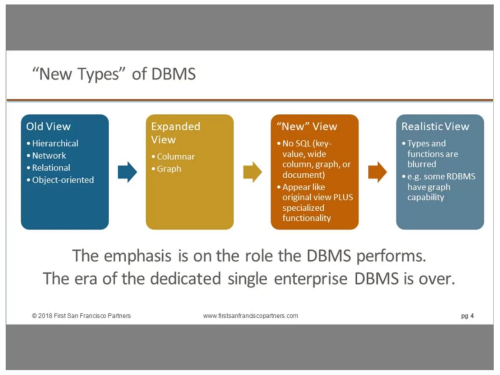Kelle O’Neal kicked off our September webinar, Advanced Databases and Knowledge Management, by saying she was looking forward to covering this topic and how it ties core, almost “low-level technology” to the knowledge management concept — “one that people have been working on for decades now and are still innovating around.”
Kelle’s co-presenter was FSFP consultant John Ladley, an information management industry veteran and knowledge management SME. They teed up the webinar with definitional remarks and content about database management systems (DBMS) technology and the connection to today’s analytics and data science work — and how these areas push the envelope forward on knowledge management.
What follows are brief highlights from the one-hour webinar. To listen to the full replay or review our presentation material, visit DATAVERSITY’s webinar archive.
Overview of DBMS Technologies
John talked about the historical view of a DBMS and compared it to newer views of this technology and its importance today.

Presentation material for the September DATAVERSITY webinar, Advanced Databases and Knowledge Management, can be found on SlideShare.
Key Points About Graph Databases
- A Graph database is one designed to treat the relationships between data as equally important to the data itself.
- There is less emphasis on a pre-defined model for structure.
- Data is “stored” like we first draw it out — showing how each individual entity connects with or is related to others.
- Consider the complicated, many-to-many-to-many relationships.
DBMS Usage in Analytics
DBMS technology needs and attributes:
- Functionality of Data Warehouse
- Virtualization or Logical Data Warehouse
- Real-time analytics
- Context-independent
- Multiple formats
- Lineage, metadata and mapping of massive amounts of diverse content
- Foundation for AI
- Structured data analysis
- Advanced analytics
- Visualization
Knowledge Management Defined
John shared a knowledge management definition, saying the context, metadata and relationships are as important as the values of the records:
“Knowledge management turns the potential capacity of raw “connected and collaborative intelligence”, i.e. all those brains at the end of the computer, into a “collective know-how” that will improve operations, competitiveness and value. … It is a sum of information assets, … and most importantly, the un-captured, tacit expertise and experience resident in the minds of people.” — John Ladley
Questions from the Webinar
- Do you know what capabilities you are trying to enable?
- Do you know business latencies?
- Are you looking at native or conceptual aspects for database use cases?
- Are you keeping track of the vendors?
- Can you manage and afford many DBMS, or do you need to work hard with one or two large players?
Next Up in October: Data Supply Chain Webinar
Our next Data Insights & Analytics program, Lessons Learned from Building a Data Supply Chain, is Thursday, October 4. It features a special guest, George Yuhasz, the Director of Business Intelligence and Data Services for Keystone Foods.
If you’d like to keep in touch with First San Francisco Partners regarding upcoming webinars and industry events we’re connected to, please share your contact information with us.

